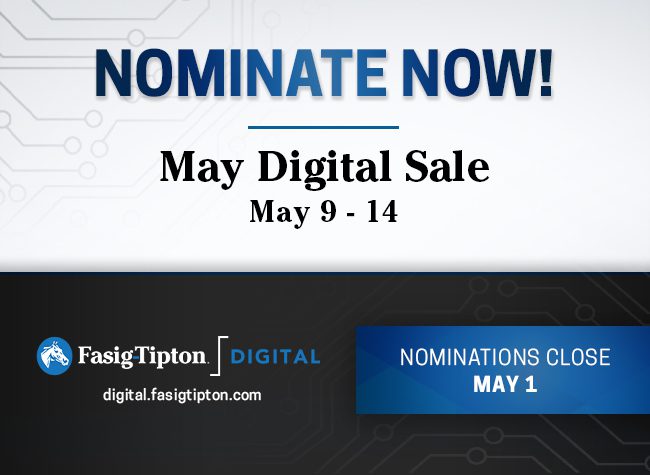By Ben Massam
In the context of an increasingly competitive stallion market, more and more farms are opting to reward loyal customers by offering incentive programs to their breeders. WinStar Farm launched its WinStar Incentive Network (WIN), a rewards program for breeders of WinStar-sired racehorses, on Breeders' Cup weekend in early November, and promptly saw three qualifying runners capture their respective championship races. The program, which is offered to breeders who breed two mares to any WinStar stallion, rewards black-type successes at a variety of levels with 'WinStar Dollars,' applicable to a future breeding season [click here to read more]. The TDN's Ben Massam spoke with Elliott Walden, President and CEO of WinStar Farm, to discuss the growing notion of incentive programs and his outlook for WIN.
TDN: Why did you decide to start the WIN program?
EW: We wanted to try to do something to help the breeders. We looked at a lot of options. There are many programs out there for loyal customers, from frequent flyer awards to credit card cash back to loyalty programs at restaurants. We looked for a way to create an incentive to reward our breeders. Let's face it, breeders are in a dogfight every day to make it work. Buyers are getting a little more polarized in terms of what they like and don't like, so breeders need all the help they can get. That's why we started the program.
TDN: Do you think that incentive programs are becoming a necessity in the present day, given the competitiveness of the stallion market?
EW: The stallion market is definitely very competitive, and there are all kind of ways that you can incentivize a breeder to earn your business. I do think you'll see more and more of it, and we just want to get ahead of the curve and think proactively instead of reactively.
TDN: The WIN program has a unique structure in that it places a heavy emphasis on success, specifically wins in black-type races. Do you see this as an effective differentiation strategy?
EW: Yes, we think it differentiates us from others. There are a lot of farms out there that want to breed every mare out there, and we want to breed a lot of mares, too. But we also want to focus on quality. We felt that the WIN program will do that–it will promote the breeders who are having success on the racetrack… One of the things I find very attractive about the program is that it can build on itself within a breeder's program. A breeder that typically breeds in the $20,000 to $30,000 stud fee range might win a $100,000 award because they win a Breeders' Cup race or the Kentucky Derby. And that might allow them to breed to a better horse that they wouldn't necessarily have bred to, to begin with. It upgrades their whole program.
TDN: You launched the WIN program on Breeders' Cup weekend and saw three WinStar-sired horses [Classic Empire (Pioneerof the Nile), Tourist (Tiznow) and Tamarkuz (Speightstown)] reach the winner's circle. Was this a successful demonstration of how the program works at the highest level?
EW: It's been six weeks since the inception of the program and we've had breeders earn $450,000. Breeders are going to like it a lot, and the people who have already won are extremely excited about it. When they have success with a WinStar stallion, it allows them the chance to get something besides what they got for the yearling at the beginning or what they sold the horse for…For participation in the WinStar Network, we require breeding two mares per year to keep all the horses eligible that they've ever bred. From that standpoint, it's a program for the people who are loyal to us.
TDN: WinStar offers a large roster of stallions at different price points. From this perspective, do you think the WIN program is optimal for giving breeders a multitude of options with the 'WinStar Dollars' they accrue?
EW: We have different bloodlines, different price points. The roster is so broad in its range that hopefully a breeder can find a couple mares to breed over here. They can use the WinStar Dollars in multiple different ways, in multiple seasons. In fact, we encourage that. The awards are given on a no-guarantee basis, so once you use it, you have the option of acquiring insurance for it–which we recommend if you're using it all on one horse. The better way to do it, in my eyes, would be to spread it over three or four stallions and reduce the stud fee on those four stallions. Then you defray the risk of it and self-insure, so to speak. You're going to get three out of four mares in foal, if not four of four.
TDN: How did the WinStar shareholders respond to the concept of the program?
EW: Any time you launch a new program, you can't say with certainty how it's going to play out. All our horses here at WinStar Farm are syndicated, and we had to go to our shareholders and sell them on the idea that this was a win/win–that we are going to reward our breeders for a job well done with the hopes that they come back with loyal support and want to breed with our shareholders' stallions. Almost to the man, everybody thought it was a good idea. Obviously, it comes with a price, and each shareholder had to give a little bit to put this program on. This is not a WinStar Farm program, per say. It's a stallion program, and it's basically funded by our shareholders, which include us.
TDN: How has the program been received by breeders in its first few weeks?
EW: We've gotten a great reception. People are asking questions when they're mating their mares, and they understand that they need to breed two mares here to be eligible. Some of them are even mating an extra mare to make sure that they're eligible. The main thing here at WinStar is that we don't want anybody to not be eligible. At the end of the breeding season, we want to make sure that everybody has bred two mares or at least made the decision to not breed two mares. So we're making sure we communicate that clearly and effectively…People understand that this a program that, based on our projections over the last four years, is going to pay out approximately $1.2 million to $1.6 million per year–or 75 awards per year–in WinStar Dollars to be used on stud fees, and that's an extremely impactful thing. Right now, from the beginning of November, we've had 16 award winners in six weeks.
Not a subscriber? Click here to sign up for the daily PDF or alerts.






